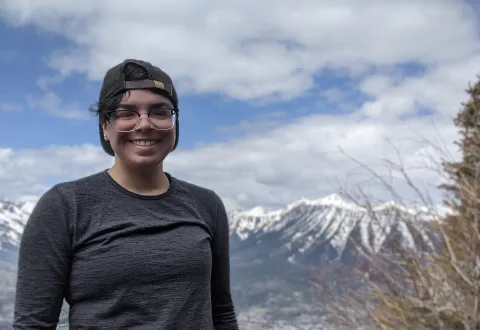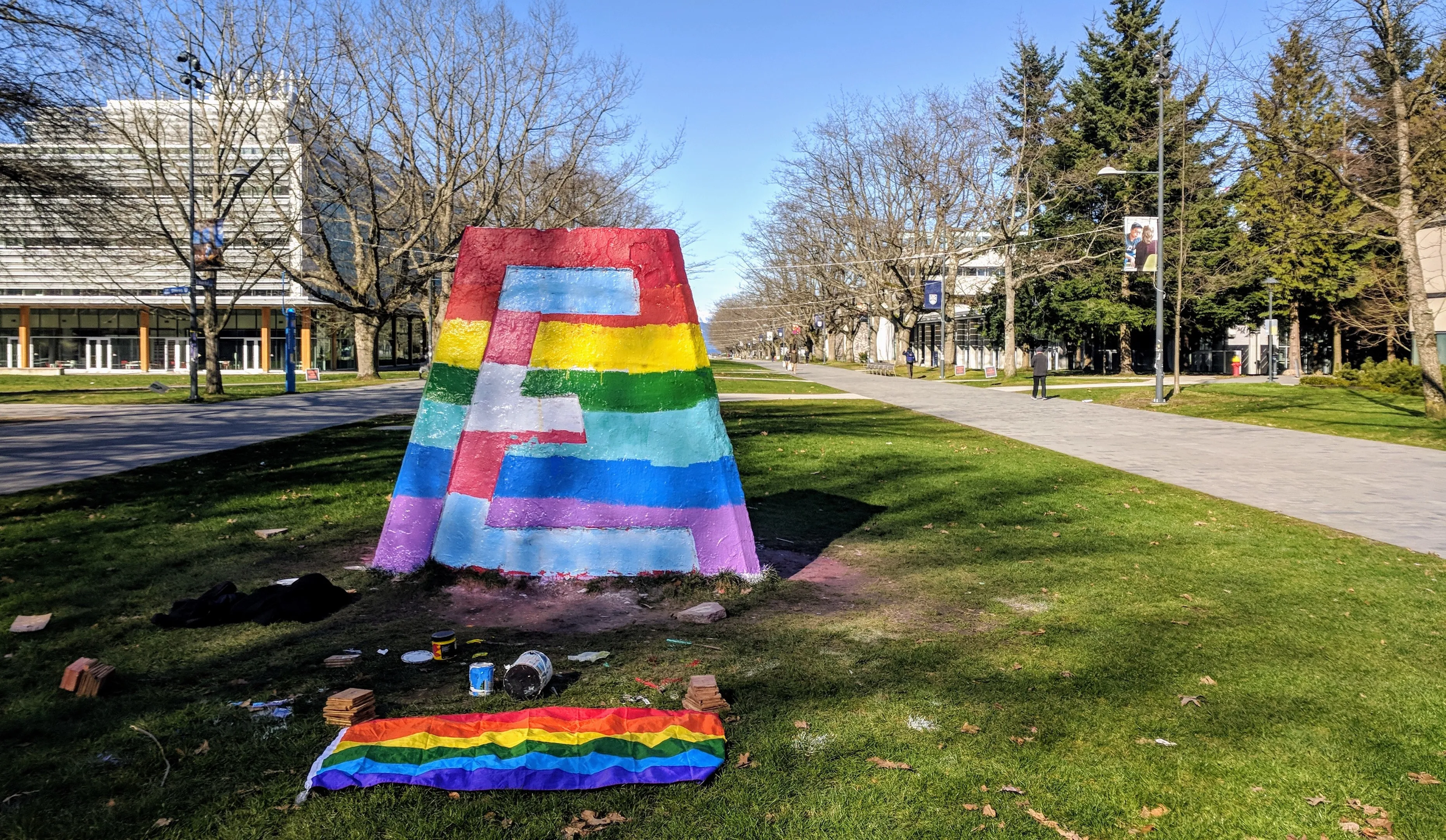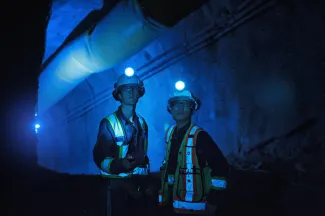"Ask for help and don’t be afraid of failure. Engineering is a team sport — we’re all in this together."

Julianna Weldon
- Degree:
- Bachelor of Applied Science
- Grad year: 2021
- Program:
- Campus: Vancouver
In high school I did everything. I was on several sports teams (including the curling team), I did band, leadership camp, theatre, arts classes, and writing. Any opportunity that seemed cool, I would absolutely sign up for — and things haven’t changed much since then. I was always interested in space, I read a lot of sci-fi, and I loved math classes. Engineering seemed like a perfect fit — it’s interdisciplinary, hands-on, and there’s a great sense of community.
First year was an absolute blast; I grew up in Ontario and coming to BC and having constant access to the beach and the mountains was special. Being in the mining program was such a great fit — it combined my love of the outdoors with heavy machinery and productivity. I drove through the BC interior for the first time in 2017, and I got so excited seeing the big green haul truck in Sparwood. Now I live in Sparwood and work at one of the mines in the Elk Valley. I get to see autonomous haul trucks out my bedroom window and work on projects that deliver cutting-edge technology to mining operations.
Why did you choose to go into your field of study at UBC?
Engineering is a pretty special place — we’ve got a pretty stellar community of all-star individuals (as you’ll see, as more APSC Rising Star bios come out). Picking engineering was easy; when I was in high school, I was caught between pursuing fine arts or pursuing engineering. My aunt told me that it was much easier to do an engineering degree and have arts as a hobby rather than have a fine arts degree and do engineering as a hobby — and I stand by that.
Picking a discipline within engineering after that was hard — I like to code, and I like design. I was thinking of doing engineering physics or computer engineering, but I had a pretty rough go at first year and ended up repeating first year to get enough credits to get into second year. After that, I was happy to be placed in any department, and I was lucky enough that mining picked me. Mining is by far the best program — you get to learn about surface chemistry, chemical processing, loading and hauling, explosives, soil mechanics, and environmental design. It can take you anywhere, whether you want to work in a downtown office, or do a fly-in fly-out lifestyle with a couple weeks on site and then a couple weeks vacation every month. It’s not all rocks and trucks though — technology is hitting the mining industry in a big way. There’s drones on site for surveying, autonomous haul trucks, Starlink internet trials, remote operating sensors, and a metric tonne of big data to sort through.
What has made your time at UBC memorable?
My time with the Engineering Undergraduate Society was special. I worked my way up from being a student volunteer in first year to eventually becoming one of the executive members. Building the engineering community and designing the t-shirts that 1000 first year students all wore at the Imagine Day rally was overwhelming. I got to make so many connections with incoming first years, plan parties, make a yearbook, and spend countless hours in council meetings debating policy.
I think the best project I worked on during my time at UBC was my capstone project. Mining students are encouraged to find projects while on co-op terms, and work with industry to solve problems. I probably had one of the coolest co-op jobs — sure some other students worked at Tesla, but I worked at a mine that was piloting autonomous haul trucks that haul hundreds of tonnes of rock. The average haul truck tire is around 12 feet tall, and 4.5 tonnes (that’s 4500kg!) and my capstone project was around how tire performance varies between autonomous haul trucks and conventional manned haul trucks. It was a huge data project, with temperature and pressure data being collected on tires every couple minutes. I’ll never look at tires the same way again!
Tell us about your experience in your program. What have you learned that is most valuable?
The UBC mining program is all about breadth — it’s really interdisciplinary, and you learn a lot about a lot of different things. From exploration, underground mine design, open pit mine design, drill & blast, mineral processing, closure — because you’re introduced to so many topics, you can really go anywhere. Because there’s so much content, I think the most important thing I learned was to listen and ask questions. Learn from others because they have a lot to share. Getting different perspectives is important to solving problems; nothing is made in a vacuum. Some of the best solutions come from outside the industry, because other industries have the same problems. Fatigue that astronauts experience is the same fatigue that haul truck drivers experience, and we can share monitoring systems and strategies for that.
The opposite also holds true — processes used in the mining industry can be used elsewhere. The prime example I can think of was my favourite course: a grad-level e-waste mining course I took in my final semester. Applying the four years of mining education to the e-waste recycling process was really cool and at the end of the day, mineral processing is just extracting the good stuff (valuable metal) out of the bad stuff, so why shouldn’t we apply that to recycling? I didn’t expect the mining engineering program to have so much focus on a circular economy and how mining fits into that.
What advice would you give a student entering your degree program?
I think the best advice is to build your network — make friends with upper years and people in different disciplines, ask questions about their experiences. Our professors also have a ton of industry experience and are working on some neat projects — ask them about it! You could find a summer job at the research labs through them, or work on a project about mining in space! Asking questions and actually listening to others will get you far — the more ears listening to a problem, the higher the likelihood someone has heard it before and can solve it.
Where do you find your inspiration for using your degree to make an impact on our world?
My main motivation has always been people. I’ve had a pretty great experience and I want to provide that for others and make it even better. An engineering degree is really a degree in problem-solving. I like improving processes and providing value to others. It’s that urge to fix things — have you ever gotten frustrated by a loose door handle, a disorganized drawer, a finnicky lock, or something else that adds a couple extra seconds to your day? There’s a great deal of satisfaction in solving problems, and I can’t wait to get out into the workforce and make things better.
How has your identity informed your academic and professional experiences within your field at UBC and beyond?
Back in 2016 in my second year, a couple friends and I decided that there should be a club for people in engineering under the 2SLGBTQIA+ umbrella, and we started up a club called Gears & Queers. I didn’t think it had made much of a difference until a couple years later, I found out a student had picked UBC because they’d heard about our club, and felt like they could see themselves here. Creating even a small network of people and seeing each other succeed was a beautiful thing.




